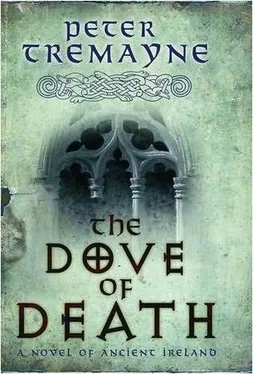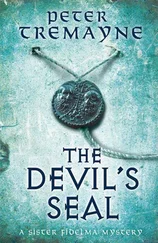Peter Tremayne - The Dove of Death
Здесь есть возможность читать онлайн «Peter Tremayne - The Dove of Death» весь текст электронной книги совершенно бесплатно (целиком полную версию без сокращений). В некоторых случаях можно слушать аудио, скачать через торрент в формате fb2 и присутствует краткое содержание. Жанр: Исторический детектив, на английском языке. Описание произведения, (предисловие) а так же отзывы посетителей доступны на портале библиотеки ЛибКат.
- Название:The Dove of Death
- Автор:
- Жанр:
- Год:неизвестен
- ISBN:нет данных
- Рейтинг книги:5 / 5. Голосов: 1
-
Избранное:Добавить в избранное
- Отзывы:
-
Ваша оценка:
- 100
- 1
- 2
- 3
- 4
- 5
The Dove of Death: краткое содержание, описание и аннотация
Предлагаем к чтению аннотацию, описание, краткое содержание или предисловие (зависит от того, что написал сам автор книги «The Dove of Death»). Если вы не нашли необходимую информацию о книге — напишите в комментариях, мы постараемся отыскать её.
The Dove of Death — читать онлайн бесплатно полную книгу (весь текст) целиком
Ниже представлен текст книги, разбитый по страницам. Система сохранения места последней прочитанной страницы, позволяет с удобством читать онлайн бесплатно книгу «The Dove of Death», без необходимости каждый раз заново искать на чём Вы остановились. Поставьте закладку, и сможете в любой момент перейти на страницу, на которой закончили чтение.
Интервал:
Закладка:
The girl seemed to understand his mime and pointed down the stairs saying something in her language, repeating the word ‘ kegin ’ several times.
Eadulf thanked her and moved past her down the stairway to the lower corridor. The girl had pointed almost directly under the stairs and Eadulf saw a doorway which led into an ante-room lined with shelves. Immediately his senses were bombarded with a mixture of aromas, sweet-smelling herbs and spices combined with dried meats that hung from metal hooks from the ceiling. The room was like a narrow corridor through which he passed quickly and, opening a door at the far end, he entered into a courtyard. In the covered area on one side were three great clay brick ovens and places where a fire could be lit in such a manner that a pot could be placed on an iron arm over the flames. Pots and pans hung along the wall behind the ovens. In the centre of the courtyard was a well, obviously the source of the fresh water for cooking.
There seemed no one about but this was clearly the kitchen area. He thought it strange that there was no one attending to the preparation of food in such a large villa as this. The rooms along this side of the courtyard consisted of various storerooms and a few that were clearly occupied by the kitchen workers as their personal quarters. He walked along, peering into each but there was no one around.
At the far corner, another open door led into what was clearly the dispensary. He was surprised that this was not closed and locked, but saw a key hanging from a hook just inside the door and presumed that the young apothecary had forgotten to lock up. Eadulf went in, examining the shelves. At one end there was a pile of moss in water, but a moss smelling strongly of the sea. Eadulf recognised it at once for it was a red alga that he knew was found along the western shores of Éireann among the sea-bathed rocks. That was just what he was looking for.
He reached forward and picked up some, smelling it to make sure it was the same plant.
‘What do you want?’
The sharp voice caused him to start. The youthful apothecary, who had attended him, was standing in the doorway. He was tall, with curly blue-black hair and dark eyes, with a swarthy face and a permanent furrow over his brows as though in constant thought.
‘I am looking for something that will relieve the soreness in the back of my throat and chest and the uncomfortable feeling in my stomach,’ replied Eadulf, trying to remember his name. ‘I think I have found it.’
The young man’s frown deepened as he glanced at the plant Eadulf held.
‘You appear to have a good knowledge of the healing qualities of plants and herbs,’ he observed suspiciously.
Eadulf confessed that he had studied the art in Tuaim Brecain, a great medical college of Éireann.
‘I have not heard of it. However, you have picked a wise choice in pioka ruz ,’ the young man said, nodding to the moss he held. ‘It should settle your ailment.’
Eadulf tried to repeat the name and added: ‘It is called carraigin in the language of Hibernia.’
‘It is a good demulcent,’ confirmed the young man. ‘You know how to use it?’
‘If I can boil a little of the plant to produce a syrup…?’
‘There is no need. I was preparing such a mixture earlier this morning as it is also used to make sweet dishes. I make a jelly substance mixed with honey, which the lady Trifina especially likes. Come, I will give you some.’
The young man pointed to the bowl standing near to where Eadulf had picked up the moss. He took an empty dish and measured out several spoonfuls from the bowl.
‘There now, it is a syrupy taste that coats the throat and will also make its way to your stomach. Perhaps you would like a spoonful of honey to sweeten the taste more?’
Eadulf shook his head as he tried an experimental spoonful. As the familiar taste of what he knew as carraigin made contact with his tongue, he swallowed and felt its comforting contact with his throat.
‘What did you call this, my friend?’ he asked.
‘I know only the name in the language of the Bretons, which is pioka ruz . I hear that it is known by several other names in various parts of this country. It is a plant that is unknown in my land.’
‘But it grows along these shores?’
‘It does, indeed.’
Eadulf nodded appreciatively as he finished the bowl. ‘Ah, that should settle my stomach.’
‘You feel better?’
‘Better than when I was lifted from the sea,’ smiled Eadulf, trying to regain his sense of humour.
The young man nodded. ‘It was the worst place on this island to attempt a landing.’
‘My name is Eadulf, by the way.’ Eadulf decided to change the subject and introduce himself.
‘That I know,’ responded the young man.
‘And your name is…? I think I heard it spoken but have forgotten.’
‘Heraclius of Constantinopolis.’
‘And you are Greek then?’ Eadulf said. ‘You are further from home than I am.’
‘Indeed, I am,’ Heraclius said dryly. ‘My father, Callinicus, was of Heliopolis in the land of Phoenice. He had to flee from there before my birth when our armies were defeated at Yarmouk by Abu Ubaida ibn al-Jarral over thirty years ago.’
‘Alas, I know nothing of these names nor of that part of the world.’
‘Abu Ubaida commanded the great Muslim army and after our defeat at Yarmouk most of our people fled from Heliopolis leaving behind much booty for him. My father went to Constantinopolis to take service with the emperors of Byzantium.’
‘I have vaguely heard of these Muslims. When I was in Rome, I was told about them raiding the coastal towns,’ Eadulf said. ‘Was your father also an apothecary?’
The young man shook his head quickly.
‘No. He was an architect. He built some of the great buildings for which Heliopolis had been famous.’
‘But you became an apothecary?’
‘I did.’
‘How did you come here? It is a long way from your home.’
‘I decided to leave Constantinopolis to seek my fortune for there is a surfeit of apothecaries at home. I took ship with a merchant and travelled through the Middle Sea to Massilia. Finally, a year ago, I came to this country, this land they called Bro-Waroch, and took service with the noble family here. They appreciated my skills and so I stayed here.’
‘You are young to have made such a journey.’
The young man shrugged. ‘I am five and twenty years, but a youthful countenance is passed down in my family. Callinicus appears to be more my brother in appearance than my father.’ Eadulf had placed the age of the apothecary at around twenty years. Heraclius was examining him with interest. ‘Why did you give up the path to being a healer? You say that you have studied the art?’
‘I studied only that I might be of some assistance to my brethren, but not to spend my time in a dispensary,’ replied Eadulf.
‘Ah, yes. I forget that you are a religious. You are the companion of this Hibernian lady…’
‘She is my wife,’ Eadulf corrected him.
‘Ah.’ Heraclius nodded. ‘Then you do not follow this concept that all religious must be celibate and remain separate from one another, as does Abbot Maelcar? We, too, in the East, do not believe that all our religious should be celibate.’
‘I once thought I should follow that path,’ affirmed Eadulf. Then he frowned a little. ‘So you know Abbot Maelcar?’
‘While I prefer to follow my experiments here, I serve this family and often go to the mainland. I have met him and, I confess, I do not like him.’
Eadulf realised the passing of time and made a quick apology. ‘I must now find Fidelma. Have you seen her?’
Читать дальшеИнтервал:
Закладка:
Похожие книги на «The Dove of Death»
Представляем Вашему вниманию похожие книги на «The Dove of Death» списком для выбора. Мы отобрали схожую по названию и смыслу литературу в надежде предоставить читателям больше вариантов отыскать новые, интересные, ещё непрочитанные произведения.
Обсуждение, отзывы о книге «The Dove of Death» и просто собственные мнения читателей. Оставьте ваши комментарии, напишите, что Вы думаете о произведении, его смысле или главных героях. Укажите что конкретно понравилось, а что нет, и почему Вы так считаете.











